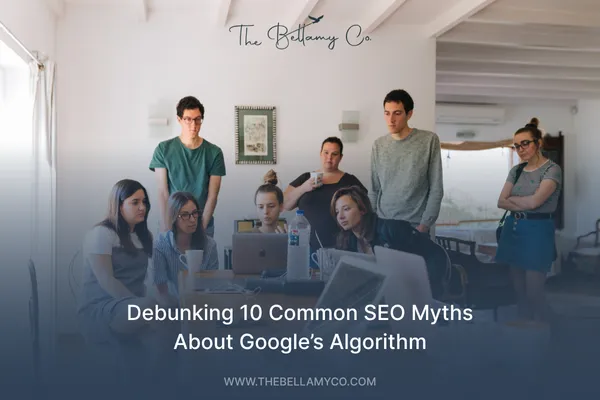The Bellamy Co. Blog
Welcome to The Bellamy Co. Blog, where transformation meets inspiration! Our mission is to redefine success for women worldwide, offering change through our Freedom Project.
In here you’ll find stories of women in business, our hot takes on what it means to be successful, testimonies of women in our community, and actionable tools and insights to help you be ready to shatter glass ceilings, follow your career aspirations and achieve personal fulfillment!


Dare to Dream: The Bellamy Co. Origin Story
Ashley's story resonates with aspiring women entrepreneurs as she steers challenges, discovers her passions, and embraces a life driven by desire rather than duty.

SEO Myths: Debunking 10 Common Misconceptions in 2025 | The Bellamy Co.
Debunking 10 Common SEO Myths About Google’s Algorithm
When it comes to showing up on Google, everyone wants to be on the first page. But there’s a lot of confusion out there about how Google works. Some people say adding tons of keywords helps. Others think you need thousands of links. Some even believe Google punishes websites for using the same words twice!
The truth is, many of these ideas are just myths… they sound true, but they’re not.
In this blog, we’ll debunk 10 common SEO myths and explain what’s real and what’s not. We’ll explain what matters for Google’s algorithm and how to make your website better in the right way. Understanding these truths will help you use the right strategies and avoid mistakes.
TL;DR Here's what's inside . . .
Debunking 10 Common SEO Myths About Google’s Algorithm
Top SEO myths you should stop believing today
1. Keyword stuffing improves rankings
2. More backlinks always mean better rankings
3. Meta tags are no longer important
4. Google penalizes websites for duplicate content
5. Social media directly boosts SEO rankings
6. Google’s algorithm updates always harm websites
7. You must submit your site to Google manually
9: Exact match domains guarantee higher rankings
How to stay up-to-date with SEO facts?
Top SEO myths you should stop believing today
Let’s explore these widely believed but false SEO rumors that may be costing you traffic, leads, and revenue.
1. Keyword stuffing improves rankings
Many people believe that repeating the same keyword many times will help their website rank better on Google. They think stuffing their pages with keywords will make Google notice them more. But this is not true anymore. Google’s algorithm is very smart. It understands when a webpage is just trying to repeat the same words to trick the system. This is called keyword stuffing, and Google can punish sites that do this.
Research shows that websites with natural keyword use perform much better. For example, a study by SEMrush found that the average keyword density on pages ranking in the top 10 is around 1-2%, meaning keywords appear naturally but are not overused. Why… Because Google wants to give users useful and readable content. If you keep repeating “best chocolate cake” over and over, your writing sounds strange and doesn’t help readers.
Instead, use keywords naturally in your text, titles, and descriptions. Write clear sentences that explain your topic well. Use related words and phrases. This helps Google understand your content better and makes your page easy to read.

2. More backlinks always mean better rankings
Backlinks are links from other websites to yours. Many people think that the more backlinks you have, the better your website will rank. But this is only partly true. The quality of links matters much more than the number. Google looks at where those links come from. Links from trusted, high-authority websites (like big news sites or popular blogs in your field) are very valuable. But links from low-quality or spammy sites can hurt your rankings.
For example, if a university website links to your page, Google trusts your site more. But if you get 100 links from unknown sites with spammy content, Google might see this as suspicious. The best way to get good backlinks is to create helpful, original content that others want to share. Outreach and partnerships with trusted sites can also bring valuable links.

3. Meta tags are no longer important
Some say meta tags like the meta description don’t matter anymore. That’s an SEO myth. While meta tags alone won’t guarantee top ranking, they play a key role in SEO.
The meta description is often shown in search results and helps people decide if they want to click. Writing clear, keyword-relevant meta descriptions improves your click-through rate, which can indirectly improve your ranking. Similarly, your page’s meta title still guides search engines on what your page is about. Optimizing these tags is a simple, effective way to help your SEO efforts.

4. Google penalizes websites for duplicate content
Many people worry that if their website has the same content on multiple pages, Google will punish them. This is a common myth. Google does not penalize duplicate content in most cases. Instead, it tries to choose the best version to show in search results, which means it may ignore or rank down other duplicates.
For example, if you sell the same product on multiple pages with slightly different descriptions, or if news sites copy the same press release. In this scenario, Google’s algorithm decides which page is the original or most useful. The best way to handle duplicate content is to avoid it when possible or use canonical tags to tell Google which version to index.

5. Social media directly boosts SEO rankings
Many digital marketing experts think social media likes, shares, or followers will improve their seo ranking. This is not true. Google has confirmed that social signals are not a direct ranking factor. That said, social media can boost your SEO indirectly by increasing your content’s reach. When more people see and share your posts, you get more organic traffic and possibly more backlinks, which do impact your search engine rankings.
Also Read: What Defines Good Website Design in 2025?
6. Google’s algorithm updates always harm websites
People often get worried when Google announces algorithm updates. Many think these updates are designed to harm websites and cause traffic drops. But the reality is more balanced. Google updates its algorithm regularly to improve organic search results for users. Some updates do affect rankings, especially for websites using spammy tactics, but many updates simply improve how Google understands content.
For example, the 2021 Page Experience Update focused on website speed and mobile usability. Sites optimized for these factors benefited, while poorly optimized sites didn’t necessarily get penalized but ranked lower due to poor user experience. So, the best approach is to keep your website high-quality, fast, and user-friendly.

7. You must submit your site to Google manually
Some people think they must tell Google about their website by submitting it manually, or else Google won’t find their pages. Google’s bots are very good at finding new websites by following links from other sites. If your site is linked somewhere, Google will probably discover it soon.
Submitting your website’s sitemap in Google Search Console can help Google find and index your pages faster, but it’s not required. Studies by Moz show that well-linked websites get indexed within a few days, even without manual submission. If your site is brand new and has no backlinks, submitting a sitemap helps speed up discovery. But once your site starts to grow, manual submission becomes less important.

8: SEO is a one-time task
Many believe SEO is something you do once and forget about, expecting the site to rank forever. SEO is more like gardening , it requires ongoing care and attention. Search engines and user behavior change over time. Competitors also improve their websites, so you must keep up.
Statistics show that websites that regularly update content and maintain SEO efforts continue to rank higher over time. Updating your pages, fixing technical issues, and adding relevant content helps you stay competitive and maintain or improve rankings.
9: Exact match domains guarantee higher rankings
In the past, having a domain name that exactly matched your keyword (like bestchocolatecake.com) helped rankings. Today, Google focuses more on content quality, user experience, and backlinks than on domain names.
A study by SEMrush in 2024 shows that exact match domains do not have a significant advantage anymore. If your website is slow or has poor content, even an exact match domain will not rank well. So, choose a domain name that is easy to remember, brandable, and represents your business well.

10. SEO results are instant
Many expect that after doing SEO work, their site will instantly appear on the first page of Google. But SEO takes time. Google needs to crawl, analyze, and rank your pages. Depending on competition and site authority, results can take weeks or months to show.
Patience and consistent SEO efforts pay off with lasting improvements in ranking and traffic. Avoid shortcuts or “black-hat” SEO tactics, as these can lead to penalties and hurt your site’s ranking in the long run.
How SEO myths can cost you?
Believing in these SEO misconceptions can cost you more than just lost ranking — it can waste your time, money, and effort. For example, stuffing the keywords inorganically may get you penalized and dropped in search engine results. Ignoring ongoing SEO needs can let competitors outrank you. Misunderstanding algorithm changes may cause you to abandon good strategies.
How seo myths can cost you includes:
Loss of organic traffic due to poor optimization
Wasted budget on ineffective SEO tactics
Reduced visibility from outdated seo efforts
Damage to your site's reputation through penalties
Missing out on ranking opportunities with proper keyword research

How to stay up-to-date with SEO facts?
The best way to avoid falling into SEO misconceptions is to stay informed. Follow trusted SEO blogs, Google’s official announcements, and industry experts. Regularly conduct an SEO audit to track your site’s health metrics and performance. Use tools that analyze core web vitals, backlinks, and keyword density.
Remember to focus on:
Creating new content regularly
Improving local SEO if relevant
Optimizing for user intent and search query satisfaction
Ensuring your site is fast, mobile-friendly, and secure
Monitoring changes in search engine algorithms
Read More: How Much Does It Cost To Redesign A Website In 2025?
Bottom line
Ignoring SEO myths can cost you dearly in ranking and traffic. Google’s algorithm is smart and rewards sites that focus on quality content, proper optimization, and a solid backlink profile. Understand that search engine optimization is an ongoing process, not a one-time fix. By staying informed and adaptable, you can improve your ranking and achieve your online goals.
Stop losing time to SEO misconceptions that hold your site back. Start focusing on proven strategies that work. At The Bellamy Co., we help you cut through the noise and focus on what truly improves your search engine ranking. Book a Discovery Call with us and get a tailored plan that delivers real results.


Facebook
Instagram
LinkedIn
TikTok